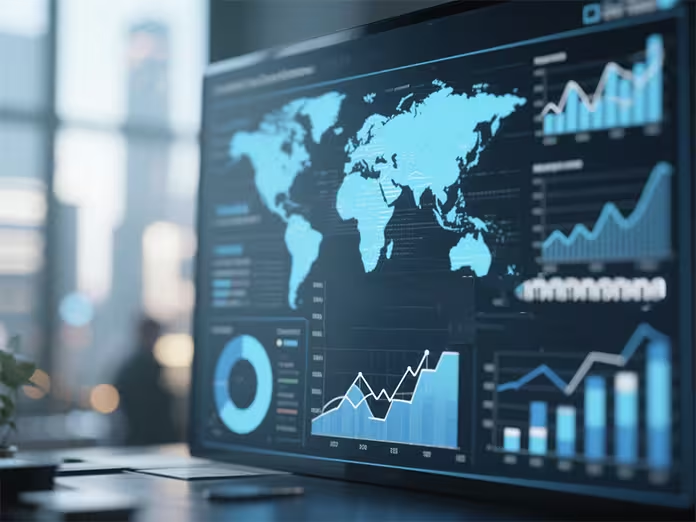
The global digital economy key trends are reshaping how we live, work, and conduct business at an unprecedented pace. As we navigate through 2025, the digital transformation has accelerated beyond traditional boundaries, creating new opportunities and challenges that demand our immediate attention.
The Digital Revolution: More Than Just Technology
The global digital economy represents far more than technological advancement—it’s a fundamental shift in how value is created, distributed, and consumed worldwide. Currently valued at over $6.8 trillion, this digital ecosystem continues expanding at breakneck speed, with emerging markets leading much of this growth.
What makes today’s digital economy particularly fascinating is its democratizing effect. Small businesses in remote locations can now access global markets, while consumers enjoy unprecedented choice and convenience. This transformation isn’t just happening in Silicon Valley; it’s occurring simultaneously across continents, creating a truly interconnected economic landscape.
Artificial Intelligence: The Game-Changing Catalyst
Perhaps no trend within the global digital economy key trends is more transformative than artificial intelligence. AI has moved beyond experimental phases into practical applications that are revolutionizing industries daily. From predictive analytics in healthcare to automated customer service in retail, AI is becoming the backbone of digital operations.
The integration of AI with existing business models is creating entirely new revenue streams. Companies are discovering that AI doesn’t just improve efficiency—it enables completely new ways of delivering value to customers. Machine learning algorithms are now capable of identifying market opportunities that human analysts might miss, while natural language processing is breaking down communication barriers in global commerce.
Generative AI, in particular, is democratizing content creation, software development, and even scientific research. This technology is enabling smaller companies to compete with industry giants by automating complex tasks that previously required significant human resources.
The Metaverse Economy: Virtual Worlds, Real Profits
The metaverse represents one of the most intriguing aspects of current global digital economy key trends. Virtual environments are evolving into legitimate economic spaces where real money changes hands for digital goods and services. Companies are establishing virtual storefronts, hosting digital events, and creating immersive customer experiences that were impossible just a few years ago.
What’s particularly compelling about the metaverse economy is its potential to create entirely new job categories. Digital architects, virtual event coordinators, and NFT artists are just the beginning. As these virtual worlds become more sophisticated, we’re likely to see the emergence of complex virtual economies with their own currencies, marketplaces, and regulatory frameworks.
The gaming industry has pioneered many metaverse concepts, but adoption is now spreading to education, healthcare, and professional services. Virtual meetings are becoming more engaging, remote learning more interactive, and digital collaboration more effective.
Cryptocurrency and Digital Assets: Mainstream Adoption
Cryptocurrency has evolved from a niche interest to a mainstream financial instrument. Central bank digital currencies (CBDCs) are being explored by governments worldwide, while businesses increasingly accept cryptocurrency payments. This shift represents a fundamental change in how we think about money and financial transactions.
The global digital economy key trends show that digital assets are becoming integrated into traditional financial systems rather than replacing them. This hybrid approach is creating new investment opportunities while maintaining the stability that traditional financial institutions provide.
Blockchain technology, the foundation of cryptocurrency, is finding applications far beyond digital currency. Supply chain management, digital identity verification, and smart contracts are all benefiting from blockchain’s transparency and security features.
E-commerce Evolution: Beyond Online Shopping
E-commerce has transcended simple online shopping to become a comprehensive ecosystem of digital commerce. Social commerce, where purchases happen directly through social media platforms, is growing exponentially. Live streaming commerce, particularly popular in Asia, is expanding globally as consumers seek more interactive shopping experiences.
The integration of augmented reality (AR) with e-commerce is solving one of online shopping’s biggest challenges—the inability to physically examine products before purchase. Virtual try-on features, 3D product visualizations, and AR-powered home design tools are making online shopping more confident and satisfying.
Mobile commerce continues dominating, with smartphones becoming the primary interface for digital transactions. This shift is particularly pronounced in developing markets, where mobile-first approaches are leapfrogging traditional e-commerce infrastructure.
Remote Work Revolution: Redefining Professional Landscapes
The remote work revolution has permanently altered the global employment landscape. Digital nomadism is no longer an alternative lifestyle but a mainstream career choice. This trend is creating new economic opportunities in previously overlooked regions while challenging traditional concepts of workplace productivity and corporate culture.
Cloud-based collaboration tools, project management platforms, and virtual communication systems have matured to the point where distributed teams can be as effective as co-located ones. This evolution is enabling companies to access global talent pools while reducing operational costs.
The gig economy, powered by digital platforms, continues expanding beyond traditional sectors. Professional services, creative work, and specialized consulting are increasingly delivered through digital platforms that connect freelancers with global clients.
Data as the New Oil: Privacy and Value Creation
Data has become the most valuable asset in the digital economy, but this reality comes with significant privacy and ethical considerations. Companies that can effectively collect, analyze, and act upon data insights gain competitive advantages, while consumers become increasingly concerned about privacy rights.
The global digital economy key trends indicate a growing emphasis on privacy-first approaches to data utilization. Technologies like federated learning allow companies to gain insights from data without directly accessing personal information, while zero-party data strategies focus on voluntary information sharing with clear value propositions.
Regulatory frameworks like GDPR and emerging data protection laws worldwide are shaping how companies approach data collection and usage. Organizations that proactively address privacy concerns while delivering personalized experiences are likely to thrive in this evolving landscape.
Looking Forward: Preparing for Tomorrow’s Digital Economy
The global digital economy key trends we’re witnessing today are just the beginning of a much larger transformation. Quantum computing, advanced robotics, and biotechnology integration promise to create even more dramatic changes in how digital and physical worlds interact.
Success in tomorrow’s digital economy will require adaptability, continuous learning, and strategic thinking about how emerging technologies can create value for customers and society. Organizations and individuals who embrace these changes while maintaining ethical standards will be best positioned for future success.
The digital economy’s rise isn’t just about technology—it’s about reimagining human potential in an interconnected world where geographic boundaries matter less than innovation, creativity, and the ability to solve meaningful problems through digital means.


































